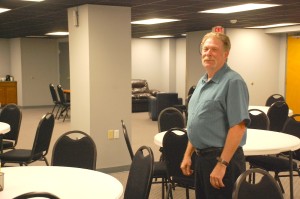This story originally appeared in the August 13 edition of the Laurel Star. is posted with permission and the original article can be read here: Tony Russon Digital Clips

Project OpportunitySM free entrepreneur training for vets will be offered this fall. There is an interest meeting beginning 6:30 p.m. Monday, Aug. 24, at the Wicomico Partnership, 408 Cole Circle in Salisbury.
Military service can give a person access to as much self-knowledge as it can intellectual knowledge. Training teaches them a skill, but it also teaches a lesson about limits and wherewithal. Increasingly, though, learning to translate military training into marketable private sector skills upon discharge can be difficult. This seems to be particularly true in Maryland, which has the highest unemployed veteran rate in the country.
Project OpportunitySM, a program aimed at walking vets through the entrepreneurial process, aims to change that. Founded by Army veteran Joe Giordano, Salisbury, Md., in 2010, Project OpportunitySM provides veterans from throughout the peninsula who have the will a way to focus their drive. Over the course of a little more than two months, participants will learn to create a solid business plan and then write that plan.
The ten-week course can be challenging, even for people who already have endured boot camp, but in the end, the successful participants have a document they can take to a bank, investors, or one of the other entrepreneurial support programs, like SCORE or the Salisbury Small Business Development Center.
Over the last five years, Giordano has held at least two sessions per year all over the middle of the state. He’s had a hand in helping successful entrepreneurs on the Eastern Shore, in Anne Arundel and Howard counties and throughout southern Maryland. Over the last five years, more than 140 people have graduated from the program, one-third of whom were on the Eastern Shore. Giordano said the program has an 87-percent completion rate.
When he started Project OpportunitySM, Giordano already had more than a decade of private sector experience in workforce development. Working with states, counties and municipalities as well as private industry, he was able to put his organizational experience from the military to good use in the private sector.
But experience is only part of the equation. Giordano knew he needed the right tools to accomplish his vision of establishing a free program to help veterans bring their ideas into the real world. To that end, he elected to follow the NxLevel Curriculum, a nationally recognized training program. Using the guidelines and course materials Giordano constructed the bones of the program.
As with any other project, it requires a lot of people with a lot of expertise to get all the work that needs to be done completed. Small business owners have to, at the very least, have a working knowledge of the financial, marketing and legal aspects of running a business. To this end, Giordano engages speakers who come in and do workshops with the students: bankers review their cash flow analyses, marketing professionals review their marketing plans, etc.
At the end, students know whether or not their plan needs more work or whether it might make sense to begin seeking finance immediately. In either case, the program already will have given them the tools they need to take the next step.
The training is intensive, so people are encouraged to have a working idea about the business they would like to start.
“I need veterans who are focused, because we hit the ground running,” Giordano said.
The program includes 30 hours of classroom time (three hours per week for 10 weeks) and about 25 hours per week of homework.
The homework is for real. The Project OpportunitySM training assumes that people come to work. Giordano said that for many, the first week is the hardest, because even though the participants believe they know what it is like to have to do 25 hours of extra work every week, it isn’t until they are in the middle of it that the true implications hit home.
“When we tell them there’s 25 hours of outside work, a lot of times I don’t think they understand what that means,” Giordano said.
Before the classes start in September, there is an interest meeting, to give people a program overview.
“I call it the good the bad and the ugly of entrepreneurial training,” Giordano said.
During the two hour presentation, he lays out the course description and takes questions about procedures and opportunities. Even though the classes are free, class space is limited, so it is important that people who are interested are prepared to make the commitment. Commitment and dedication aren’t a real problem for veterans, but it is critical that they are informed about the entire project.
This session of classes will be split between Easton and Salisbury. The Easton classes will be held at the DLLR Workforce Center on Bay Street, and the Salisbury classes will be held at the Wicomico Partnership on Coles Circle.
